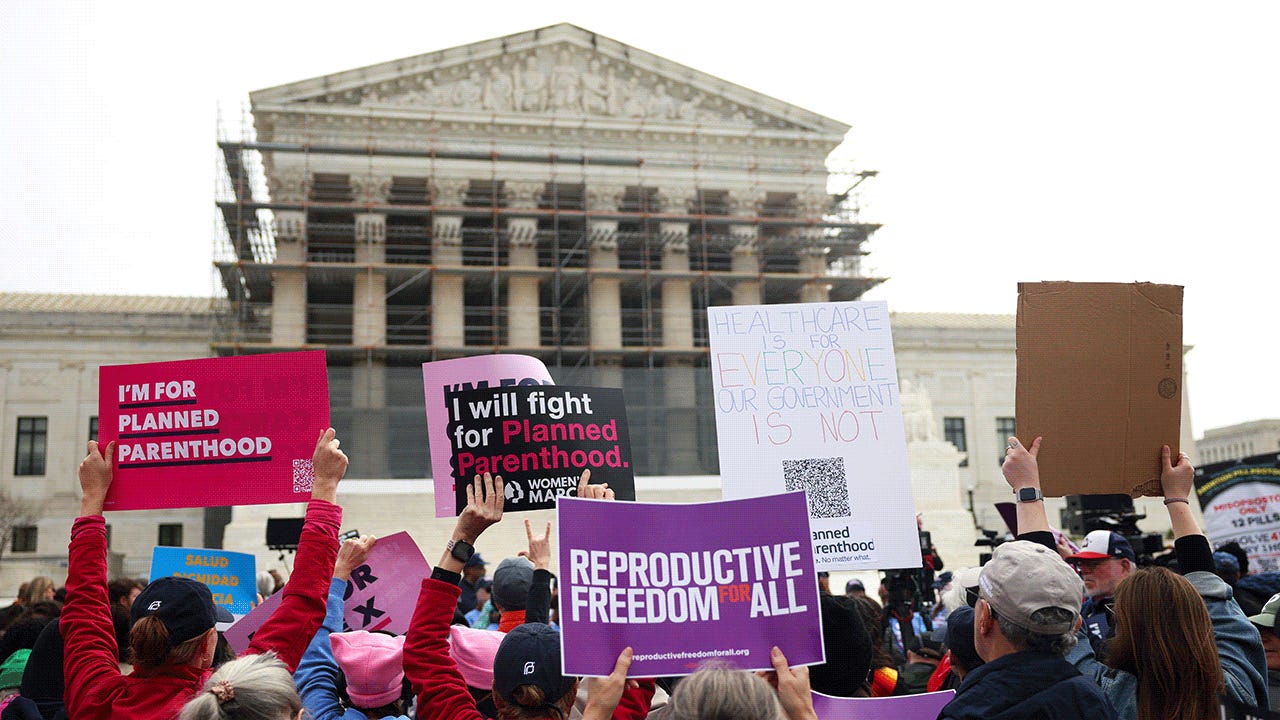Today's News: Supreme Court Rules Against Planned Parenthood’s Right to Sue Over Medicaid Defunding
While the case was technically about procedural legal standing under Medicaid law and the Civil Rights Act of 1871, it has significant implications for Planned Parenthood’s funding.
Photo: Kayla Bartkowski via Fox News
Overview
Date: June 26, 2025
Topic: Supreme Court Rules Against Planned Parenthood’s Right to Sue Over Medicaid Defunding
Summary: The Supreme Court, in a 6-3 decision, ruled that Planned Parenthood and its Medicaid patients cannot sue South Carolina over the state’s 2018 executive order to deny the organization Medicaid funding. The ruling focused on whether the federal Medicaid statute grants individuals the right to sue to enforce their choice of medical provider, with the majority concluding it does not. While the case was technically about procedural legal standing under Medicaid law and the Civil Rights Act of 1871, it has significant implications for Planned Parenthood’s funding and Medicaid patients' access to care, particularly in conservative states seeking to limit the organization’s operations.
Sources
CNN - Supreme Court lets red states target Planned Parenthood funding
NBC News - Supreme Court rules for South Carolina in its bid to defund Planned Parenthood
The Washington Post - Supreme Court allows states to cut off Medicaid funding for Planned Parenthood
Key Points
The Supreme Court ruled 6-3, along ideological lines, in favor of South Carolina, preventing Planned Parenthood and its patients from suing the state over Medicaid defunding efforts.
Justice Neil M. Gorsuch authored the majority opinion, stating that the federal Medicaid statute does not “clear[ly] and unambiguous[ly]” confer an individual right to sue for enforcement of provider choice.
Justice Ketanji Brown Jackson wrote the dissenting opinion, joined by Justices Sonia Sotomayor and Elena Kagan, arguing that the decision undermines civil rights protections and will result in “tangible harm to real people” by depriving Medicaid recipients of their right to choose their doctors.
The case stemmed from a 2018 executive order by South Carolina Governor Henry McMaster to deny Medicaid funds to Planned Parenthood, arguing that even non-abortion funding subsidizes the abortion industry.
While federal law already prohibits Medicaid funding for abortions (with limited exceptions), the case concerned non-abortion services such as contraception, cancer screenings, and STD testing.
Both Governor McMaster and Planned Parenthood South Atlantic President Paige Johnson released statements, with McMaster praising the decision as a victory for state authority and values, and Johnson condemning it as a “grave injustice” that will worsen healthcare access.
Lower courts, including the U.S. Court of Appeals for the Fourth Circuit, had previously sided with Planned Parenthood, allowing the suit to proceed, before the Supreme Court reversed their decisions.
Unique Highlights
The New York Times notes that the Supreme Court rarely rules that a federal law “unambiguously confer[s] individual federal rights” for individuals to sue, citing Health and Hospital Corporation of Marion County v. Talevski (2023) as a recent exception.
CNN highlights a sharp debate between Justice Clarence Thomas and Justice Ketanji Brown Jackson over the meaning of a central Reconstruction-era law (Section 1983) that allowed people to sue the government for civil rights violations. CNN also mentions that President Donald Trump’s administration supported South Carolina’s position, a break from the Biden administration.
NBC News specifies that 18 states backed South Carolina in the case.
Fox News explicitly identifies the legal provision at the center of the case as “Section 1983 – part of the Civil Rights Act of 1871.”
The Washington Post identifies Judge J. Harvie Wilkinson III (a Reagan nominee) and Judge James A. Wynn Jr. (an Obama nominee) as the judges on the U.S. Court of Appeals for the Fourth Circuit panel that previously ruled in favor of Planned Parenthood. It also mentions the Trump administration separately withholding Title X funding from nine Planned Parenthood affiliates.
The Wall Street Journal provides details on Planned Parenthood’s national structure, noting its network of about 50 local affiliates operating some 600 clinics and recent financial stresses including other federal funding cuts, drops in contributions, layoffs, and clinic closures.
Contrasting Details
While all articles agree on the procedural nature of the ruling (whether individuals can sue), some sources emphasize the broader anti-abortion implications more strongly.
Fox News frames the ruling as a “major pro-life victory,” and The Wall Street Journal describes it as a “financial blow to the abortion provider,” explicitly linking the outcome to the abortion debate.
In contrast, The New York Times and The Washington Post focus more on the legal question of the “right to sue” and the impact on “Medicaid patients” and their choice of healthcare provider, with abortion being mentioned as a background context rather than the primary focus of the legal argument.
The Newsie Project uses AI to summarize, compare, and contrast the reporting of the major US and world online news sources.
This is an evolving project. Tools, approaches, and output formats will change over time. The Newsie Project does not attempt to provide a definitive capsule of any news story. While the incidence of errors in these summaries is low, and I attempt to spot-check details, AI tools can hallucinate. Please click through and read the articles for details (some may be paywalled).


